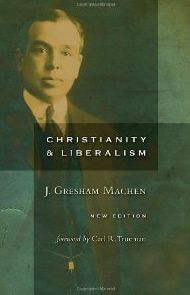Christianity and Liberalism: Chapter 2
 Thursday, June 9, 2011 at 5:03PM
Thursday, June 9, 2011 at 5:03PM  I still don’t have a copy of Christianity and Liberalism. Yesterday Amazon.ca gave me a refund on my order, saying that the package containing the book was “undeliverable,” whatever that means. I was tracking my order on the UPS website and it looks to me like it never left their Concord, ON facilities, so I’d say they didn’t try very hard to deliver it. I may be foolishly optimistic, but I’ve reordered the book and look forward to having it in my hands this time next week.
I still don’t have a copy of Christianity and Liberalism. Yesterday Amazon.ca gave me a refund on my order, saying that the package containing the book was “undeliverable,” whatever that means. I was tracking my order on the UPS website and it looks to me like it never left their Concord, ON facilities, so I’d say they didn’t try very hard to deliver it. I may be foolishly optimistic, but I’ve reordered the book and look forward to having it in my hands this time next week.
Thankfully, I have a PDF copy of Christ so I’m still able to participate in Tim Challies’ Reading Classics Together. This week’s chapter, the second, was titled “Doctrine,” and I’d sum it up a defense of the importance of doctrine to true Christianity.
I’ll admit that I found last week’s introductory chapter a little ho-hum, mostly because it was dated. Not so with this week’s chapter. First, the importance of doctrine is one of my favorite topics, and second, while Machen wrote with the liberal Christianity of his day in mind, what he wrote we completely applicable to certain currant movements within Christianity.
I’m bet you’ve heard people downplay the importance of doctrine in contrast to the importance of living a Christian life. That’s an idea that Machen deals with thoroughly in this chapter. It is clear, he says, that even in it’s early stage, the Christian movement,
was not just a way of life … but a way of life founded upon a message. It was based, not upon mere feeling, not upon a mere program of work, but upon an account of facts. In other words it was based upon doctrine.
As evidence of this, he uses the example of the different reactions from Paul in regards to, on the one hand, the teachers who preached Christ out of rivalry in Philippians, and on the other, the Judaizers in Galatians. Paul is tolerant of the rival teachers “because there the content of the message that was being proclaimed … was true.” In contrast, he opposed the Judaizers because the content of their teaching was false.
Paul saw very clearly that the differences between the Judaizers and himself was the differences between two entirely distinct types of religion; it was the differences between a religion of merit and a religion of grace.
The teaching of Jesus, too, “was rooted in doctrine.” If we have “a nondoctrinal religion, or a doctrinal religion founded merely on general truth, we must give up not only Paul, not only the primitive Jerusalem Church, but also Jesus himself.”
The nondoctrinal Christianity of liberalism is, Machen concludes, not Christianity at all, but “a naturalistic negation of all Christianity.” Liberalism is a rival of Christianity and in opposition to it in every way, and examining that opposition is the point of the following chapters in Christianity and Liberalism, starting in the next chapter with doctrines about God and about man.



Reader Comments